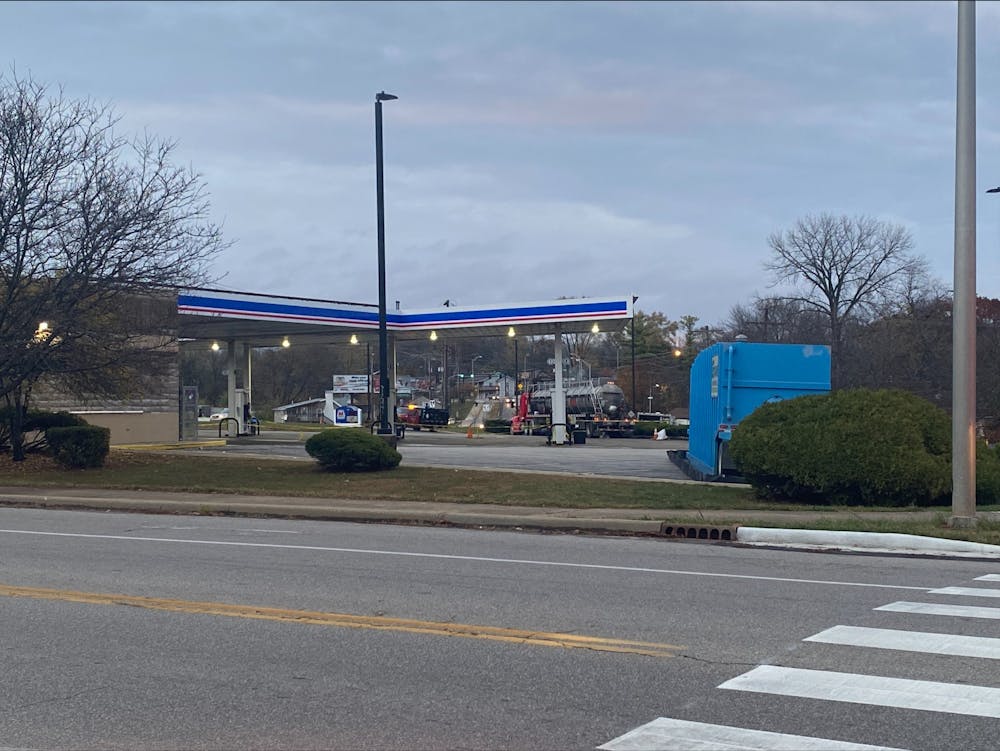A leak in an underground holding tank or pipe caused a large gasoline spill at a Marathon gas station located at 1307 W. Third St. on Oct. 31.
This leak resulted in a large release of fuel into the sanitary and sewer system in Bloomington. To stop the leak, the fuel from the storage tanks and the surrounding areas was removed the same day.
RELATED: ["Gas leak reported near Seventh Street and Rose Avenue has been repaired"]
The Dillman Road Wastewater Treatment Plant detected the odor from the gas Oct. 30 and suspended its operations by diverting the incoming water flow to the equalization basin.
The equalization basin is a large open pond where wastewater is deposited. It allows the water to evaporate through solar radiation and wind, leaving concentrated residual waste to be treated, Andrew Krebbs, communications director for the City of Bloomington, said in an email.
Krebbs said the equalization basin allowed the hydrocarbons from the gas to evaporate naturally.
He said there are no damages or long-lasting effects at the Dillman Road Wastewater Treatment Plant since the plant operators were able to catch the spill early enough and divert the flow. The plant operations are now running smoothly again.
“I completely commend the utilities staff and the fire staff realizing there was something wrong and then how fast they moved to find the source of the leak, and to make sure everyone was safe,” Krebbs said. “So, at no time was anyone in danger,”
Krebbs said the Indiana Department of Environmental Management is doing a full investigation of the Marathon gas station since there was most likely a defect in the underground storage tank and piping.
IDEM representatives are also supervising the area by the Marathon gas station, Krebbs said.
Allen Carter, IDEM communications director, said Marathon has hired a remediation company, which is an environmental cleanup contractor. Marathon is currently in the remediation process.
Usually, remediation for a gas leak means removing any contaminants from the soil and other contaminants in the area.
He said the remediation company has 20 days from when the gas leak occurred to file a cleanup report to IDEM, which will be publicly available. The report will contain more details regarding how the gas leak occurred and the remediation process at the gas station.
Quinton Deppert, office of water quality employee for City of Bloomington Utilites and a Students for a New Green World member, said any parcel of property at Marathon which may have been contaminated with gas or any other hazardous substances from the gas leak will be labeled as a brownfield.
RELATED: ["Large underground gasoline leak spills into Bloomington sewer system"]
This means the land may or may not be able to be used depending on the results of the remediation. If they are usable, they will have restrictions, Deppert said.
Deppert said it’s the gas station owners who are responsible for the cleanup of the gas leak, not the oil companies. The problem with this, he said, is gas station owners are operating on a slim margin profit from the gasoline that is sold.
Gas stations owners mostly profit from what is sold in the convenience stores rather than from selling gasoline. This is due to gas stations usually being franchises that purchase gas wholesale from oil companies, he said. Gas station owners then have the responsibility of maintaining and paying for the underground storage tanks to prevent leaks, while oil companies obtain most of the profits from the gasoline, Deppert said.
“What this really points to is the fact that our oil distribution system in this country is broken,” he said. “These oil companies have a strangle hold on the way that oil and gas are distributed to gas stations.”






